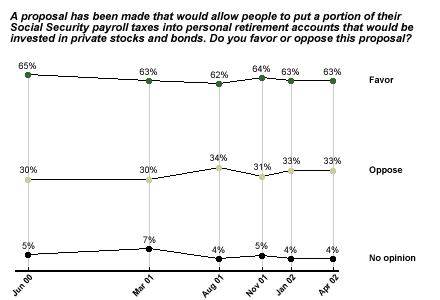The American public has historically favored the idea of Social Security privatization and investment, but a recent Gallup study indicates that the support, while high on the surface, may be somewhat overstated. An April 8-11 Gallup poll* shows that 63% of Americans favor private investment of Social Security funds, while 33% oppose the idea and 4% have no opinion. Responses to this question have been very consistent since Gallup began asking it in June 2000.

But those results may somewhat overstate the underlying support for Social Security investment. Further analysis yields key insights into the vigor of Americans' opinions on the issue. Respondents to last month's study were also asked a follow-up question: Would they be upset if their previously expressed opinion did not prevail when the issue was ultimately decided? The opinions of those who said they would not be upset were classified as "permissive, " while the opinions of those who said they would be upset if the issue was not resolved to their liking were classified as "directive." Presumably, "directive" opinions are more strongly held than "permissive" opinions, because respondents claim to be emotionally invested in them.
The results:
|
Public Opinion on Proposal to Establish Personal Retirement Accounts From Part of Social Security Taxes** |
|||
|
Classification of Opinion |
|||
|
Response Categories |
Overall |
Directive |
Permissive |
|
% |
% |
% |
|
|
Favor, upset if not passed |
27 |
27 |
|
|
Favor, but not upset if not passed |
36 |
36 |
|
|
No opinion |
4 |
4 |
|
|
Oppose, but not upset if passed |
13 |
13 |
|
|
Oppose, upset if passed |
20 |
20 |
|
|
TOTAL |
100 |
47 |
53 |
Gallup's experiment indicates that the percentage of people who have a "directive" opinion on the matter -- i.e., those who say they are likely to care whether their opinion prevails -- is much smaller than the percentage of people who simply say they favor or oppose the proposal. More than half of the public (53%) indicate they would not be upset no matter what happens to such a proposal. The rest are somewhat divided, with slightly more people in favor (27%) than opposed (20%).
Of particular significance is the fact that about half of Americans, 49%, express an opinion on the issue but then say they would not be upset if the opposite of their preference actually occurred. As shown in the "permissive" column, 36% favored the proposal but would not be upset if it did not pass, and 13% opposed the proposal but would not be upset if the proposal did pass.
Key Points
Qualifying public opinion about Social Security privatization in this way indicates that, while a majority of Americans claim to favor the idea in general, a high proportion -- 53% -- does not feel strongly about the issue one way or another. With regard to those who do offer more strongly held "directive" opinions, we see that supporters of the proposal outnumber the opponents by 27% to 20% -- a much narrower margin than the 30% gap seen when "permissive" opinions are included. In essence, the political battle for the Americans who have an emotional stake in the issue of Social Security privatization is much closer than initial findings might indicate.
*Results are based on telephone interviews with 1,003 national adults, aged 18 and older, conducted April 8-11, 2002. For results based on the total sample of national adults, one can say with 95% confidence that the maximum margin of sampling error is ±3%.
**Moore, David W., & and Jones, Jeffrey M. (2002, May). Directive vs. Permissive Public Opinion. Paper presented at the annual meeting of the American Association for Public Opinion Research, St. Petersburg, Fla.
